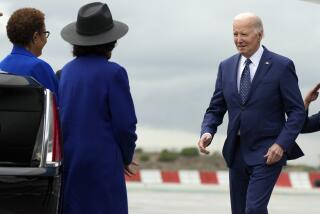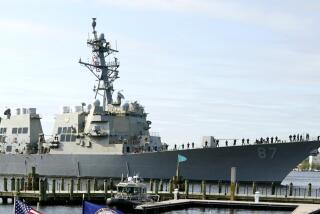Port hysteria
- Share via
WHEN MEMBERS OF CONGRESS TAKE homeland security seriously, it’s a welcome development. Unfortunately, Tuesday’s bipartisan hissy fit over the Bush administration’s approval of a Dubai company’s $6.8-billion deal to manage six important U.S. ports is neither serious nor welcome.
At first glance, Dubai Ports World’s acquisition of the British-owned Peninsular and Oriental Steam Navigation Co. looks troubling: Do we really want a company from the United Arab Emirates, one of the only countries that recognized the Taliban as the legitimate government of Afghanistan, acting as the maritime gatekeeper for New York, Miami, Philadelphia, New Orleans, Baltimore and Newark, N.J.?
After all, ports could be appealing and vulnerable targets for terrorists, handling about 2 billion tons of freight each year, only 5% of which receives close inspection. The remaining containers are vetted through an informal process that emphasizes faith in “trusted shippers.”
The problem is that blocking the Dubai deal wouldn’t do a thing to change any of that. It only provides members of Congress an opportunity to talk tough and pander to the terrorism-rattled xenophobe in us all.
Dubai Ports World, like the foreign companies that already run the majority of key U.S. ports -- including 80% of the terminals in Los Angeles -- does not own the points of entry. It is a contractor that coordinates logistics. And most important, it’s not in charge of security. Port operators work with U.S. security officials (port police, the Coast Guard, the Department of Homeland Security) in charge of preventing terrorism.
This week’s hubbub diverts attention from a pressing and genuine debate over what those agencies really need to do to keep our commercial harbors safe. Compared to airport security, port security is woefully underfunded and undeveloped.
A paper written by former Coast Guard Cmdr. Stephen E. Flynn in the current issue of the Far Eastern Economic Review calls the system a “house of cards.” Flynn argues that any terrorist worth his salt could simply seek out a well-known “trusted” shipper’s containers to stash his deadly contraband. He calls for a slate of inspection-oriented reforms, including the adoption of better screening technologies.
Who owns the companies that operate the ports isn’t the point -- it’s how those companies work together with federal and local authorities to keep ports safe. And the Department of Homeland Security has a long way to go before it figures out how best to get that done.
To be fair, congressional calls for transparency in the bidding process make sense. And any attention paid to port security is better than none at all. But by focusing on the nationality of a respected ports operator, instead of scrutinizing questionable policies or providing tangible suggestions for making the nation safer, members of Congress have once again shown their unerring knack for irrelevance when it comes to matters of homeland security.
More to Read
Inside the business of entertainment
The Wide Shot brings you news, analysis and insights on everything from streaming wars to production — and what it all means for the future.
You may occasionally receive promotional content from the Los Angeles Times.






